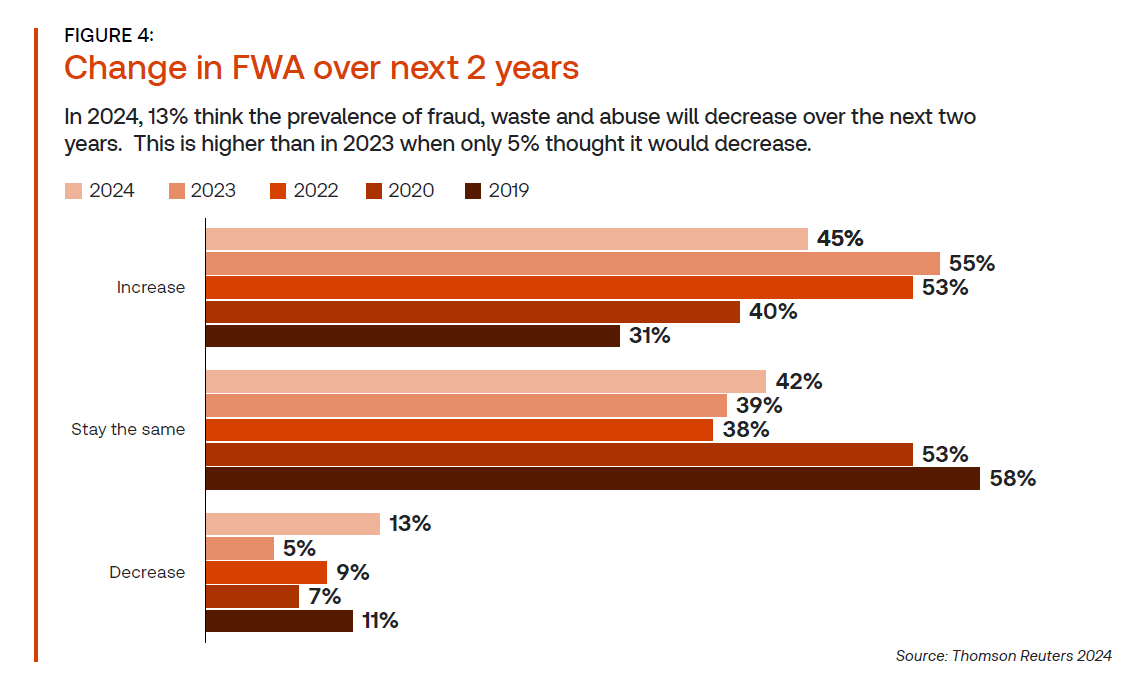A new report offers insights into the wide variety of threats to the public purse that government officials encounter every day, as well as the tools and resources they’re using to prevent, detect, and investigate fraud
According to the Thomson Reuters Institute’s recently released 2024 Government Fraud, Waste & Abuse survey report, officials responsible for disbursing public funds and safeguarding tax dollars continue to face a familiar laundry list of obstacles. Tight budgets, increasing workloads, lack of resources, outdated technology, and ongoing recruitment difficulties — all issues that past reports have explored — continue to reflect the reality of today’s government workforce challenges.
Despite budget and resource limitations, however, a majority of this year’s respondents (73%) said they are nevertheless confident they have the tools, resources, and ability to address fraud, waste, and abuse (FWA) issues in their agencies and departments. However, the report also cautions that this confidence may be somewhat illusory, given that the resources available to government employees do not give them a complete picture of the available data for verifying identities or legitimizing beneficiaries.
The survey’s respondents come from all levels of government — federal, state, county, and city or municipal. All are involved in some way in the prevention, detection, and investigation of FWA, and all regularly conduct research using public records and other investigative resources.
One consistent finding in these FWA reports over the years is that fraud is as prevalent as ever. Managers and administrators of government programs continue to cite an increase in fraud as one of their top concerns, even though the spike in fraud related to pandemic-era relief programs has largely dissipated. Indeed, 45% of government workers surveyed in 2024 say they expect to see an increase in FWA over the next two years.

False claims and forged documents are still the most common forms of fraud as well, but account takeovers and synthetic identities are not far behind. Meanwhile, waste and abuse of public funds tends to occur most often through billing for unnecessary items or services, excess charges, and kickbacks or bribes.
Artificial intelligence cuts both ways
For the first time ever, the growing interest in generative artificial intelligence (GenAI) is also part of the FWA report. However, there are at least two sides to the GenAI discussion.
On one hand, almost half (45%) of this year’s survey respondents said they can envision how GenAI might help them detect and prevent fraud. Precisely how the technology could or should be applied is still up for debate, however, and very few government agencies have allocated budget dollars to explore those options. Further, most government agencies do not currently have the technological infrastructure and data capabilities necessary to implement a GenAI solution or tool.
Criminals, on the other hand, are enthusiastically embracing the capabilities that various forms of AI provide, allowing them to become better at faking documents and creating synthetic identities. Not surprisingly, many respondents said they expect that increases in fraud over the next two years will be due at least in part to fraudsters using AI.
Prioritizing efficiency & improving processes
It is also apparent from the 2024 survey that governments at all levels continue to struggle with restricted budgets and lack of resources. Almost half (48%) of survey respondents said their most pressing issue is the increasing volume of work they are expected to handle without any additional resources
You can learn more about the “2024 Government Fraud, Waste & Abuse Report” on the latest episode of the Thomson Reuters Institute Insights podcast (now available on Spotify)
Meanwhile, when respondents were asked how their departments measure success, the top response this year was efficiency. Every year, the drive for efficiency tends to vie with service satisfaction as the most important measure of success, but efficiency won out this year due primarily to the high number of local and municipal respondents who mentioned that as a top priority.
As efficiency is the outcome of people, processes, and tools working together in the best possible way, it’s unsurprising that front-line government officials have consistently over the years expressed a desire to devote more time and energy to front-end prevention and less time to investigative activities, though there is often some overlap. For example, respondents revealed this year that they spend fully one-third (33%) of their time on identity validation, which is both a preventive measure and an investigative activity.
To detect fraud, the top methods mentioned are still cross-referencing public-records databases and investigating whistleblower tips, but one-in-five respondents also said their departments are either using or planning to use machine learning and AI to detect suspicious behavior and anomalous billing patterns. This is a sign, the report suggests, that at least some government agencies are recognizing how improved technology can enhance both efficiency and effectiveness.
A false sense of confidence?
Nevertheless, most government agencies continue to struggle technologically. In fact, more than half of the participants in this year’s survey said their agency or department does not use an integrated case-management solution or have access to advanced investigative software. Somewhat more concerning is that Google searches and use of public databases are still the primary way that governmental departments verify beneficiary information.
This year’s report also indicates that some government agencies have worked to improve their technological capabilities, but progress is slow. And unfortunately, slow progress at the current pace of technological change means that many government agencies and departments are falling behind, merely by standing still.
You can download a copy of the Thomson Reuters Institute’s “2024 Government Fraud, Waste & Abuse Report” here.







